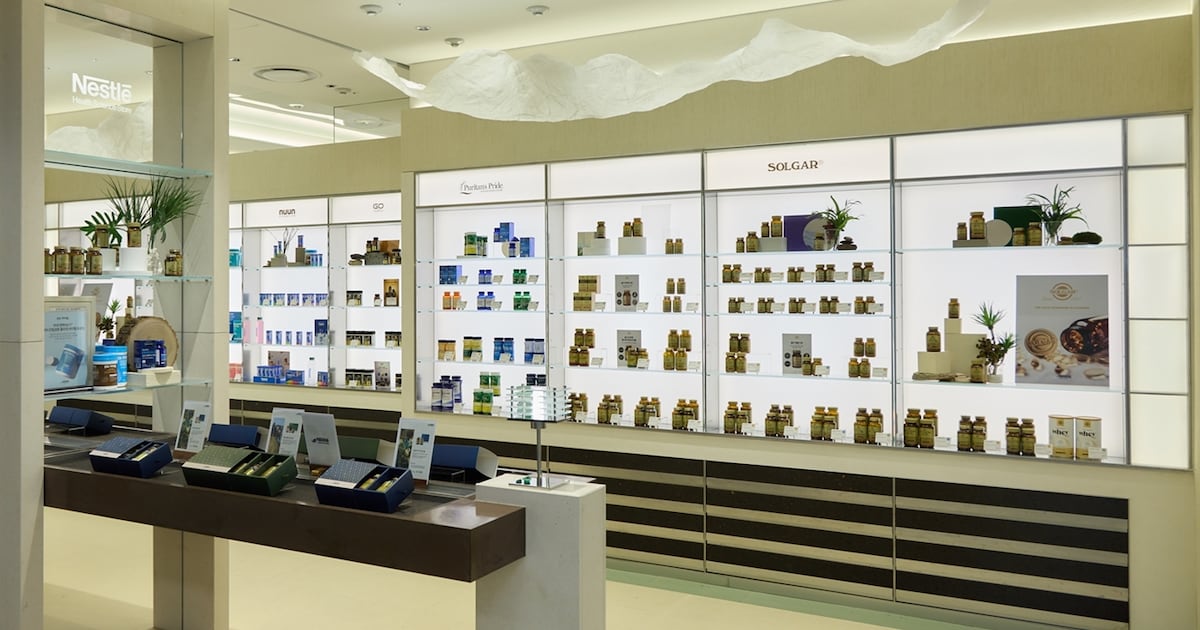The retail store is located within the Hyundai Department Store in Mokdong, Seoul.
A key feature of the store is the use of digital tools to help consumers understand their health status and obtain customized health foods recommendation.
Some of the health metrics that could be measured include body composition and micronutrients intake levels.
An example is the use of the ‘Anura Magic Mirror’, which won the Innovation Award at CES 2024. According to NuraLogix, the company behind it, this is a tabletop smart mirror that “analyzes facial blood flow information to accurately calculate a host of vital signs and disease risk assessments.”
The aim is to cater to changing consumer needs through the use of advanced technology, said Heewon Bae, business executive office of Nestlé Health Science Business Unit at Nestlé Korea.
“Nestlé Health Science Store provides a differentiated service where it suggests health functional foods optimized for individual health conditions by utilizing cutting-edge IT devices.
“The store also has digital healthcare specialized devices that can measure comprehensive health conditions such as body composition, micronutrients, and mental health, allowing for a multi-faceted analysis of personal health conditions,” Bae told NutraIngredients.
She added that the store is staffed with health consultants who have completed specialized training on the company’s products and could provide customized health food suggestion services based on the health data collected.
“In addition to product recommendations, they also provide guidance on how to consume the products.
“The store will also provide continuous health management services such as tracking changes in health status by accumulating the consumer data,” she said.
Personalized nutrition is a sector that is promoted by the South Korean government.
In January, the government officially implemented the Customized Health Functional Food System, following four years of piloting the program. Other players in the space include Lifestyle Project, Korea Arccell, and DMC.
The system requires the collection of data on individual’s health status and the presence of an in-store “customized health functional food manager” to recommend the products needed.
Aside from personalized nutrition, the store also sells about 120 SKUs of health supplements from eight key Nestle Health Science brands, including vitamin brand Solgar, collagen brand Vital Proteins, low-sugar, low-calorie effervescent electrolyte drink brand Nuun, and GO Healthy – a New Zealand brand which it acquired in 2022.
This is the first retail store that Nestle Health Science has opened in South Korea.
The partnership with Hyundai Department Store Group is also an exclusive one.
Hyundai Department Store Group is one of the largest departmental chainstore in South Korea, alongside Lotte and Shinsegae.
As South Korea’s health functional food market is growing steadily and more competitive, Nestle Health Science said it needed to work with partners with strong distribution network and have expertise in the healthcare sector.
“South Korea’s health functional food (HFF) market is growing steadily, and we expect this growth to continue in the future as well. At the same time, the market is also becoming more competitive. This is why a sound strategy and a capable partner are important.
“Through the diversified portfolio of science-based nutritional health solutions, we aim to create synergy effects with our partner who has a strong sales and distribution network as well as an expertise in healthcare sector,” said Bae.
The two companies first entered into a business alliance in 2023, and the opening of the Nestle Health Science Store is one of the most recent collaborations.
“We aim to further explore new opportunities through the partnership, including solidifying our sales network that offers broader opportunities for us to make more of our products available to more people across the country, which is one of our key goals,” said Bae.
Hyundai Department Store Group, on the other hand, said that since partnering with Nestle Health Science, its health functional foods business has shown “remarkable growth.”
For instance, revenue from Hyundai Bioland’s health supplement distribution business last year was 20.7 billion won (US$15m), which is close to a five-fold increase compared to 2023.
In the first quarter of this year, the revenue also recorded 6.3 billion won (US$4.57m), a 186% increase from the previous year.
Hyundai is also actively expanding its online and offline health functional food distribution network.
For instance, it has opened the online shopping mall ‘Hyundai Wellness’ and is also expanding its distribution channels through Naver Shopping and KakaoTalk gifting.
Offline, it is expanding its health functional foods business into duty-free stores, health and beauty store Olive Young, and into Costco as well.
